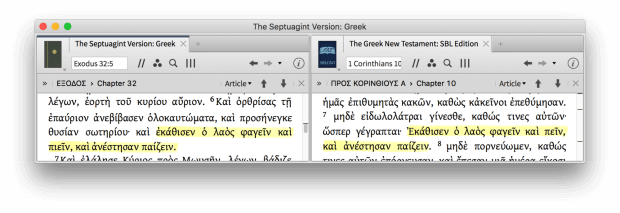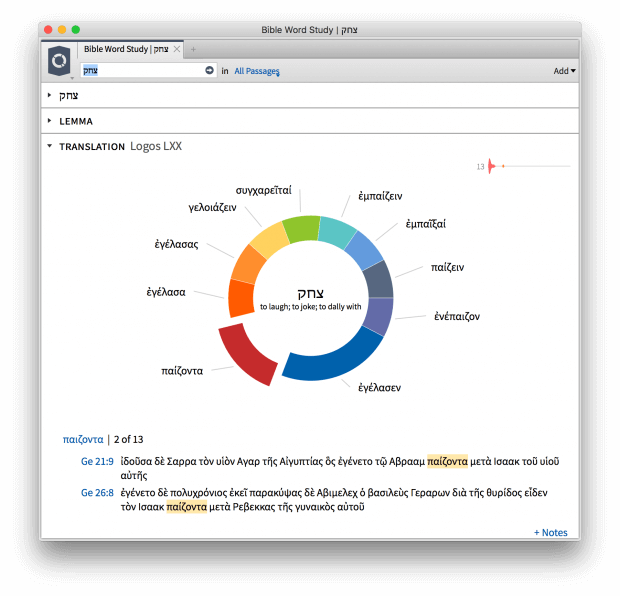I’m bad at reading the Bible quickly or in big chunks. I’m always getting stopped by interesting little questions (and interesting big ones). Here’s a representative example:
Do not be idolaters as some of them were; as it is written, “The people sat down to eat and drink and rose up to play.” (1 Corinthians 10:7 ESV)
I’ve puzzled over that word “play.” It seems a little out of place. What’s so bad about eating, drinking, and, of all things, playing?
In context, the eating, drinking, and playing are all explaining Paul’s word “idolaters.” So we know they weren’t eating animal crackers, drinking pop, and playing Scrabble. Something about the eating, drinking, and playing was idolatrous. At the very least, the animal crackers were golden-calf-shaped, the pop was spiked, and the Scrabble games were for money.
And in the context of Exodus 32, which Paul quotes here, God tells Moses, up on the mountain, that the people have “corrupted themselves.” Moses descends to a “noise like war” and a kind of “dancing” that makes him so angry he shatters the tables of the ten commandments. Whatever the Israelites’ idolatrous play was, it was pretty bad.
Checking the major English Bible translations doesn’t help a whole lot in this case, except to confirm the validity of the question. They mostly stick with the translation “play,” with a few going for “revelry.” That still doesn’t tell you what was so bad.
You could check the commentaries, of course, and you should. But I suggest starting somewhere else, even to those who don’t read Greek or Hebrew: check the Septuagint.
When to use the Septuagint
The Septuagint is the Greek translation of the Old Testament. It was what Greek-speaking Jews like Jesus and Paul read (if they had access to it) and quoted and debated and obeyed—unless they also knew Hebrew, of course. It was also “the Bible of the apostolic church—the writers of the New Testament quote from it extensively” (LBD).
A title like “The Septuagint” is a bit misleading, however. As the very helpful and accessible introduction in the T&T Clark Companion to the Septuagint points out, it’s not perfectly clear which books belong in the Septuagint. Before the widespread use of the codex, collections of “books” were hard to establish. And there were various revisions and subsequent (perhaps even competing?) Greek translations of various books. Instead of speaking of the Septuagint, it is better to think of it as “a general designation for the Greek tradition of the [Jewish] Bible” (2).
If this is all new information to you, you’ll want to read more about the Septuagint (often abbreviated “LXX” because it was said to be the work of 72—later abbreviated to 70—translators) before trying to use it in biblical study. The Lexham Bible Dictionary article would be a good place to start. But if you dutifully memorized this information from some class or some book, but have never used the Septuagint in your study of Scripture, this post is for you. We will not be exhaustive here, however, but suggestive. Let me suggest three guidelines for when to use the LXX.
1. Use the Septuagint when the New Testament quotes the Old Testament
This is fairly obvious, but it’s particularly valuable to check the LXX when the New Testament quotes the Old Testament. I’m not willing to offer a strict percentage and wasn’t able to locate one, but in my experience the majority of OT quotations in the NT are taken straight from the LXX.
Though there is (literally) one iota of difference between the two, 1 Corinthians 10:7 is a word-for-word LXX quotation:
When Paul invoked the authoritative formula, “As it is written,” he found divine authority in the words of a translation—just as we do today with our Bible translations. God’s authority isn’t stuck in Hebrew and Greek; it flows through the languages of all the families of the earth. That in itself is interesting.
2. Use the Septuagint when you need to cut the historical distance between you and the biblical event
You also turn to the Septuagint when it’s particularly useful to know what ancient Jews before Christ thought of a given passage—when you need to cut the distance between you and the event you’re reading about. The translators of the Septuagint were doing their work more than a thousand years after the golden calf incident of Exodus 32. But that’s still a lot closer to the event than you and I are, in every way. If cultural knowledge is an especially helpful piece of the interpretation of a given OT passage, the LXX may help.
And here I think cultural knowledge is indeed helpful. Because there is an interpretive option I haven’t mentioned yet, one presented by Calvin and some modern commentators: perhaps the Israelites really were just “playing”—playing games, but those games were in some way part of their idol worship. Calvin weds this point with a pithy and wise comment:
The Gentiles . . . appointed sacred games in honour of their idols, in conformity with which the Israelites doubtless on that occasion worshipped their calf, for such is the presumption of the human mind, that it ascribes to God whatever pleases itself. (323)
So maybe it really was Scrabble—Idol Scrabble, Hebrew Edition®. (You can just hear those ungrateful Israelites complaining when they get their clay tiles out of the bag: “Oh, man! No vowels again?!”)
Even if Calvin is right in his historical claim that Gentiles “played” games for idols, and I frankly don’t know, it’s difficult or impossible to know what was in the minds of the Israelites that day—unless the Bible tells us, of course. And if the LXX used a specific word for athletics, say, that might help us out.
In this case, the LXX neither confirms nor denies Calvin’s interpretation. We need a little more help. Let’s turn to the LXX one more time, for one more reason.
3. Use the Septuagint when you need to understand the Septuagint
What does “play” in 1 Corinthians 10:7 mean? We’ve looked to the LXX to help us. But we’ve got to do some more exploring. We’ve got to ask, how does the LXX itself uses this word “play” (παίζω)?
All of the major commentators look to the LXX’s usage of “play”—they all think it worthwhile. What are they seeing that we haven’t yet in this little study?
If you run a Bible Word Study in Logos on the Hebrew word translated “play” in Exodus 32:6, you’ll see it. The παίζω (paizo) root is used several times to translate that Hebrew word in other places in the LXX:
And one of those uses has definite sexual overtones:
Abimelech king of the Philistines looked out at a window, and saw, and, behold, Isaac was sporting (παίζοντα) with Rebekah his wife. (Genesis 26:8 KJV)
Scrabble can be romantic. But the kind of “playing” Isaac was doing with Rebekah immediately tipped off Abimelech, at some distance away, that Isaac and Rebekah were sexual partners. It’s not unlike the English phrases, “playing the field,” or “playing around,” though maybe not as slangy.
Genesis 26 is the main passage scholars use to argue that sexual overtones can be present in the word “play”—and that they are in fact present in Exodus 32 (and 1 Corinthians 10). Respected commentator Anthony Thistelton even suggests that the word in Exodus 32 could mean “virtual orgy” (NIGTC). And without some facility with the LXX, and a tool like Bible Word Study, you won’t find this key parallel passage discussed by the commentators.
Modern readers simply can’t recover the ancient context completely. If there were idolatrous games that the Israelites played, we may never know with any certainty. But parallel uses of “play” in the LXX, particularly Isaac “sporting” with Rebekah, combine with contextual clues to lead me to see the sexual overtones interpretation as most likely.
Conclusion
I’ve argued repeatedly on this blog that the existence of multiple English Bible translations is a great help for Bible study. There are many useful perspectives on the one text of Scripture. The Septuagint as a Bible study tool provides one you may never have thought to use, an ancient Jewish perspective, a perspective flavored by a greater familiarity with Koine Greek than anyone alive today can ever have.
Related articles
- What Is the Septuagint and Is It Valuable for Bible Study?
- How to Compare the Septuagint to the Original Hebrew in Logos
- When and How to Use the Septuagint in Your Bible Study
- 29 Bible Study Tools for Reading the Bible More Effectively
- What Is the Talmud and Is It Beneficial for Christians?







